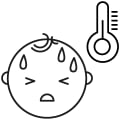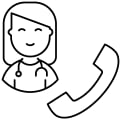Your newborn: Overview
During your baby's first few weeks, you will spend most of your time feeding, diapering, and comforting your baby. You may feel overwhelmed at times. It is normal to wonder if you know what you are doing, especially if you are first-time parents. Newborn care gets easier with every day. Soon you will know what each cry means and be able to figure out what your baby needs and wants.
How can you prepare to care for your newborn?
As you plan to care for your newborn, it's helpful to know what to expect. Your baby’s umbilical cord stump will drop off on its own. This usually happens between 1 and 2 weeks. You'll need to clean the area at the bottom of the cord 2 or 3 times a day. Talk to your doctor or midwife about how to clean and care for the umbilical area.
If you have your baby circumcised, you'll need to wash the penis with warm water after every diaper change. Doctors usually recommend putting a petroleum ointment, such as Vaseline, on the area of the diaper. Your doctor may also recommend giving your baby acetaminophen (Tylenol) for pain. Ask your doctor or midwife about the best way to care for your baby after a circumcision.
What are the signs of problems in a newborn?
Your baby may need medical care if they have any of these signs. Call your baby's doctor if you have any questions.

Call the doctor now if your baby:
- Has a rectal temperature that is less than 97.5°F or is 100.4°F or higher.
- Seems hot, but you can't take their temperature.
- Has no wet diapers for 6 hours.
- Has a yellow tint to their eyes or skin. To check the skin, gently press on their nose or forehead.
- Has pus or reddish skin on or around the umbilical cord.
- Has trouble breathing (for example, breathing faster than usual).

Watch closely for changes in your baby's health, and contact the doctor if your baby:
- Cries in an unusual way or for an unusual length of time.
- Is rarely awake.
- Does not wake up for feedings, seems too tired to eat, or isn't interested in eating.
- Is very fussy.
- Seems sick.
- Is not having regular bowel movements.
©2011-2025 Healthwise, Incorporated
